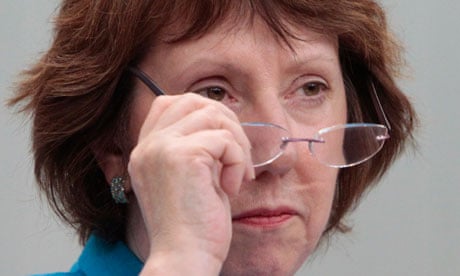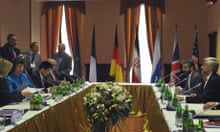High-level negotiations between Iran and six world powers were suspended after two days of talks in Moscow failed to bridge differences over the future of Iran's nuclear programme.
Contacts will now be downgraded to the level of experts from each country and bureaucrats from Brussels and Tehran. However, it was unclear how such technical discussion could help heal a substantial political rift.
"We set out our respective positions in what were detailed, tough and frank exchanges," said the EU foreign policy chief, Lady Ashton. "However, it remains clear that there are significant gaps between the substance of the two positions."
"The choice is Iran's," she added. "We expect Iran to decide whether it is willing to make diplomacy work, to focus on reaching agreement on concrete confidence-building steps, and to address the concerns of the international community."
The plan is for technical experts from both sides to meet in Istanbul on 3 July, to "increase the understanding" of the Iranian positions. After that there would be contacts between deputy negotiators from Iran and Ashton's office, and then between Ashton and the chief Iranian negotiator, Saeed Jalili, to decide whether it was worth resuming talks between Tehran and the six negotiating powers – the UK, US, France, Germany, China and Russia.
Officials from all sides insisted that downgrading the talks did not amount to a total breakdown of diplomacy, well aware that such a declaration could bring closer an Israeli military attack on Iranian nuclear sites. The decision to hold another technical meeting, made at the eleventh hour of the Moscow talks, was said by some to be a face-saving device to avoid pronouncing the talks dead on the Russian government's watch.
"They want the process to die some place else," one participant said.
Ashton denied that the planned low-level contacts amounted to talks for talks' sake, saying Iran had "engaged for the first time in the substance" of the proposal it was being offered, but she admitted there was "a very, very long way to go".
The foreign secretary, William Hague, issued a statement regretting "that Iran was not prepared to negotiate seriously on specific concerns of the international community – in particular regarding 20% enrichment."
"This is a missed opportunity to address the serious concerns of the international community," Hague said.
Speaking to the press after the Moscow talks, Jalili portrayed the agreement to hold expert meetings as an Iranian success. Prior to Moscow, Iran had said it wanted such technical discussions but Ashton's office had rejected the call saying it was time to talk about the substance of Iran's nuclear programme and its future.
In the runup to this week's talks, Iranian negotiators clarified their position and presented a response to a compromise offer by the six-nation group. However, the clarity in comparison with the last round in Baghdad simply served to emphasise the gulf between the two sides.
"We are hopeful that the technical meeting … can reach acceptable conclusions and give proposals so that Ms Ashton and I can reach a decision regarding the time and place for the next negotiations," Jalili said.
The six powers' proposition was for Iran to stop making 20%-enriched uranium, seen as the most serious proliferation threat, shut down the underground plant, and transfer its stockpile out of the country under international monitoring. In return for these concessions, summarised as "stop, shut and ship", Iran would get fabricated fuel plates for a medical research reactor, help with nuclear safety, and spare parts for commercial airliners.
Iranian negotiators rejected the deal as unacceptable, asking instead for international recognition of its right to enrich uranium in principle, and relief from sanctions, in return for suspension of 20% enrichment and co-operation with an investigation by UN inspectors into evidence of a past weapons programme.
The Moscow talks hit a low point when Jalili and his delegation arrived at the hotel venue some 90 minutes after the arranged time and asked for the planned plenary session to be put back two hours. Ashton refused to agree to political and legal expert groups, threatening at one point to end the contacts entirely, western diplomats at the talks said. However, by agreeing to meeting between nuclear experts, they said any ambiguity in the various proposals on the table can be removed, and the door left open to a resumption of full talks at a later date.
The failure to make progress in the talks in Moscow makes Israeli military action more likely, but far from inevitable.
"It's in the interests of both sides to keep talks going. Neither has any interest in declaring the death of diplomacy, especially when there is a looming threat of an Israeli strike," said Michael Herzog, a retired Israeli general.
"The Israeli reaction will be negative. Israel will say the result highlights the fact the parties are unable to continue on a high level. The differences cannot be resolved on a technical level. Israel will declare that diplomacy is failing and will probably demand the international community to set a timetable and just not let talks go and on."
Daryl Kimball, the head of the Arms Control Association in Washington insisted that Moscow should not be the end of the road for diplomacy.
"As tough as the P5+1 talks have been, diplomacy remains the best option to prevent a nuclear-armed Iran," Kimball said. "There is still time and an opportunity for diplomacy, but it is essential to reach a deal to prevent that 20% enriched uranium stockpile from growing and soon."

